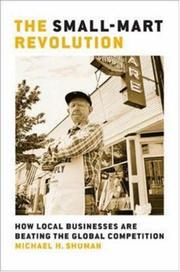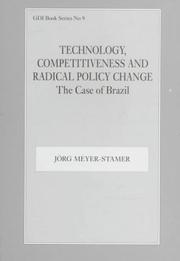| Listing 1 - 7 of 7 |
Sort by
|
Book
ISBN: 1134760655 1134760663 1280539119 9786610539116 0203014413 Year: 1996 Publisher: London ; New York : Routledge,
Abstract | Keywords | Export | Availability | Bookmark
 Loading...
Loading...Choose an application
- Reference Manager
- EndNote
- RefWorks (Direct export to RefWorks)
Some of the most successful growth economies in the Pacific Rim have combined protectionist Import Substitution Industrialisation policies with export-oriented policies. This study provides a systematic rethinking of relationships between strategies within the Malaysian context.
Import substitution --- Export marketing --- Tariff --- New business enterprises --- Industrial policy

ISBN: 1282300024 9786612300028 1576755495 9781576755495 9781609944315 1609944313 9781576755426 1576755428 1576754782 9781576754788 9781576754788 9781609944261 1609944267 9781605099002 1605099007 1576753867 9781576753866 9781576754665 1576754669 1282298933 9786612298936 9781282298934 Year: 2007 Publisher: San Francisco (Calif.): Berrett-Koehler,
Abstract | Keywords | Export | Availability | Bookmark
 Loading...
Loading...Choose an application
- Reference Manager
- EndNote
- RefWorks (Direct export to RefWorks)
"Defenders of massive multinational chains like Wal-Mart and Fortune 500 big business argue that, like it or not, there is no alternative. But in The Small-Mart Revolution, Michael Shuman shows that the benefits these megastores and huge corporations supposedly deliver to communities are illusory. Crunch the numbers and you'll find that locally owned businesses turn out to be much more reliable generators of good jobs, economic growth, tax dollars, community wealth, charitable contributions, social stability, and political participation. Unlike their global competitors, they do this without massive tax breaks and subsidies that often put local economies in a permanent hole. Plus, contrary to popular belief, local businesses are competitive with the multinationals - and gaining ground every day. Shuman highlights numerous trends that are making the old "bigger is better" economies-of-scale argument obsolete, and he describes a variety of innovative strategies these businesses are using to successfully compete with their oversized competitors. He also shows how consumers, investors, and policymakers can support their own communities by "going local.""--Résumé de l'éditeur.
Business --- Small business --- Import substitution --- Globalization --- Small business. --- Business. --- Economic aspects
Book
ISBN: 0816663351 Year: 1975 Publisher: Minneapolis : University of Minnesota Press,
Abstract | Keywords | Export | Availability | Bookmark
 Loading...
Loading...Choose an application
- Reference Manager
- EndNote
- RefWorks (Direct export to RefWorks)
The Benefits and Costs of Import Substitution in India was first published in 1975. In its basic economic plan, the government of India has fostered a policy of import substitution in virtually all industrial sectors. One industry in which the policy is followed is the automobile and ancillary industry, which is the subject of an analysis by Professor Krueger. She points out that some sort of import-substitution strategy should undoubtedly be adopted in any sensible development plan for a country such as India, but that questions arise when details of the controls and incentives used are exami
Automobile supplies industry --- Automobile industry and trade --- Foreign trade regulation --- Industries --- Import substitution
Book
ISBN: 0815791526 058520117X Year: 1995 Publisher: Washington, D.C. : The Brookings Institution,
Abstract | Keywords | Export | Availability | Bookmark
 Loading...
Loading...Choose an application
- Reference Manager
- EndNote
- RefWorks (Direct export to RefWorks)
The author considers the implications of deeper integration in the international economy for developing countries. She traces the reasons for the developing countries' reversals of earlier policies and demonstrates the importance of the open trading system for them. Anne O. Krueger is professor of economics at Stanford University.
Import substitution --- Developing countries --- Developing countries --- Developing countries --- Commerce. --- Commercial policy. --- Foreign economic relations.

ISBN: 0714643793 1280115173 0203988671 1138419184 1135777306 9780714643793 9780203988671 9786610115174 6610115176 9781280115172 9781135777302 9781135777258 9781135777296 9781138419186 1135777292 Year: 1997 Publisher: London ; Portland, OR : Frank Cass,
Abstract | Keywords | Export | Availability | Bookmark
 Loading...
Loading...Choose an application
- Reference Manager
- EndNote
- RefWorks (Direct export to RefWorks)
This volume investigates the limited effectiveness of technology policy in the inward-oriented industrialization model of the past. It looks at the political structures that compromise the transition to the development model, and the restructuring effort within Brazilian industrial firms.
Technological innovations - Brazil. --- Technology and state - Brazil. --- Technological innovations --- Technology and state --- Competition --- Import substitution --- Economic History --- Business & Economics --- Substitution of imports --- Commercial policy --- Industrial promotion
Book
ISBN: 9781400880942 1400880947 0691162913 9780691162911 Year: 2016 Publisher: Princeton, NJ : Princeton University Press,
Abstract | Keywords | Export | Availability | Bookmark
 Loading...
Loading...Choose an application
- Reference Manager
- EndNote
- RefWorks (Direct export to RefWorks)
Brazil is the world's sixth-largest economy, and for the first three-quarters of the twentieth century was one of the fastest-growing countries in the world. While the country underwent two decades of unrelenting decline from 1975 to 1994, the economy has rebounded dramatically. How did this nation become an emerging power? Brazil in Transition looks at the factors behind why this particular country has successfully progressed up the economic development ladder. The authors examine the roles of beliefs, leadership, and institutions in the elusive, critical transition to sustainable development.Analyzing the last fifty years of Brazil's history, the authors explain how the nation's beliefs, centered on social inclusion yet bound by orthodox economic policies, led to institutions that altered economic, political, and social outcomes. Brazil's growth and inflation became less variable, the rule of law strengthened, politics became more open and competitive, and poverty and inequality declined. While these changes have led to a remarkable economic transformation, there have also been economic distortions and inefficiencies that the authors argue are part of the development process.Brazil in Transition demonstrates how a dynamic nation seized windows of opportunity to become a more equal, prosperous, and rules-based society.
E-books --- Brazil --- Economic policy. --- Social policy. --- Politics and government. --- Economic policy and planning (general) --- Internal politics --- BUSINESS & ECONOMICS / Development / Economic Development. --- Argentina. --- Brazil. --- Brazilian economy. --- Brazilian miracle. --- Brazilian society. --- Dilma Rousseff. --- Fernando Henrique Cardoso. --- IPF. --- Luiz Incio Lula da Silva. --- Plano Real. --- beliefs. --- business sector. --- competitive processes. --- conceptual dynamic. --- critical transition. --- critical transitions. --- democracy. --- development. --- developmentalism. --- dominant networks. --- economic development. --- economic policy. --- emerging power. --- illiterates. --- import substitution. --- inductive framework. --- inflation. --- institutional change. --- institutional changes. --- institutional deepening. --- institutional possibility frontiers. --- leadership. --- middle class. --- military government. --- military regime. --- political elites. --- political rights. --- political transition. --- presidency. --- public goods. --- redemocratization. --- reform process. --- social inclusion. --- stasis. --- sustainable development.
Book
ISBN: 1606493531 Year: 2013 Publisher: New York, New York (222 East 46th Street, New York, NY 10017) : Business Expert Press,
Abstract | Keywords | Export | Availability | Bookmark
 Loading...
Loading...Choose an application
- Reference Manager
- EndNote
- RefWorks (Direct export to RefWorks)
Today's news media displays an intense fascination with the global economy--and for good reason. The degree of worldwide economic integration is unprecedented, and rising globalization has lifted living standards and reduced poverty. Foreign markets and new technologies continue to present opportunities for entrepreneurs and corporations. Still, economic shocks can spread across the world in minutes, impacting billions of lives. Citizens are understandably anxious in this age of macroeconomic turbulence and overextended governments. Modern economics offers a powerful framework for understanding globalization, international trade, and economic growth. Many managers possess years of hands-on experience dealing with business cycles and foreign competitive pressures, yet these leaders may not have a solid grounding in economic concepts that shed light on the forces of globalization. This book explains economics in everyday language, using little or no math, giving businesspersons better tools to interpret current events as well as long-term economic and political developments.
International economic relations. --- Globalization. --- economics --- human capital --- financial crisis --- macroeconomics --- comparative advantage --- absolute advantage --- emerging economy --- international trade --- business strategy --- economic growth --- economic history --- international economics --- political economy --- economic development --- industrialization --- labor market --- convergence --- New World --- mercantilism --- Industrial Revolution --- productivity --- technology --- capital control --- intellectual property --- research and development --- productivity slowdown --- Adam Smith --- factor proportions model --- gravity model --- infant industry --- import substitution --- Asian Tiger --- trade policy --- tariff --- public choice --- rent seeking --- trade agreement --- free trade --- liberalization --- information and communications technology --- vertical integration --- supply chain --- poverty trap --- big push --- coordination failure --- industrial policy --- diversification --- value added --- managerial capital --- skill biased technological change --- population growth --- wage inequality --- middle income trap --- tradable sector --- offshoring --- outsourcing --- foreign direct investment --- skill upgrading --- immigration --- wage structure --- regulation --- competitiveness --- corruption --- democracy --- autocracy --- socialism --- communism --- controlled capitalism --- gold standard --- natural resource curse --- business cycle --- collective bargaining --- social insurance --- safety net --- labor union --- Washington Consensus --- multinational enterprise --- exchange rate --- sweatshop --- spillover --- human rights --- labor standard --- property rights --- Dutch disease --- extractive industry --- negative externality --- pollution haven --- greenhouse gas --- global warming --- climate change
| Listing 1 - 7 of 7 |
Sort by
|

 Search
Search Feedback
Feedback About UniCat
About UniCat  Help
Help News
News